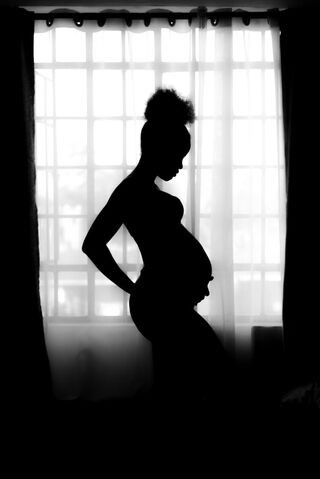Health
Does Prenatal Mental Health Matter?
Exploring why mental wellness should be a part of prenatal care.
Posted December 9, 2020

Following a positive pregnancy test, many women find themselves taking a closer look at their health regimen. Often, this assessment includes what supplements to take, what foods to avoid, and what practices to begin in order to foster a healthy pregnancy. This information commonly comes from a blend of suggested guidance from prenatal checkups, personal exploration and research, and feedback from loved ones…and the occasional stranger. Traditional prenatal care predominantly covers physical health, but mental health matters, especially during this time.
Here are 10 reasons that mental wellness should be a part of a prenatal health regimen:
1. It's not just the “baby blues.”
Most new moms experience the baby blues which commonly includes symptoms such as:
- feelings of sadness, anxiety, and overwhelm
- crying
- irritability
- mood swings
- reduced concentration
- difficulty sleeping
Baby blues often begin a few days following delivery and can last for up to two weeks. This is not the same as a pregnancy-related mental health disorder which could arise beyond this time frame, lasts longer, and is more severe. It’s important to know the distinction between common baby blues and mental health disorders. Being aware that some of the shifts in your emotional state are expected can be helpful to normalize the process. At the same time, knowing how to differentiate between a serious concern can help you distinguish when you may need to seek additional assistance.
2. Postpartum may be misleading.
When you think about mental health and pregnancy, the term postpartum may come to mind. Considering that this translates to “after delivery,” one may think that a pregnant woman has 40 weeks before having to handle the risk of mental health concerns, but this is not necessarily the case. The lesser-known perinatal depression is a mood disorder that can begin during or after pregnancy.
Symptoms can include:
- Persistent “empty” mood
- Feelings of sadness, guilt, worthlessness, hopelessness, or helplessness
- Irritability
- Restlessness
- Difficulty concentrating
- Decrease in energy
- Sleep issues
- Abnormal appetite/weight changes
- Physical pains without a clear cause
- Persistent doubts about the ability to care for the baby
- Trouble bonding with the baby
- Thoughts about harming the baby or oneself

3. Problems can span beyond depression.
To recap, mental health problems in pregnancy can be more than a short stint of sadness. Not only can it occur as a disorder, but it can encompass the wider span of pregnancy and the postpartum period. Further, it isn’t only depression that we have to be cautious of — birth-related post-traumatic stress disorder, postpartum obsessive-compulsive disorder, postpartum bipolar disorder, and postpartum psychosis are also important diagnoses to consider.
Recognizing the existence of these conditions can helpful, and even lifesaving. Postpartum psychosis is recognized to be a serious medical condition in which women may experience delusions, hallucinations, mania, paranoia, and confusion. The danger of this condition is that if left untreated, women could be at risk for harming themselves or their child.
4. Previous issues may resurface.
Mothers who have had previous mental health concerns may find these issues surfacing during or after pregnancy. When Brody and colleagues surveyed 158 pregnant and postpartum women undergoing treatment for depression at the University of North Carolina School of Medicine's Perinatal Psychiatry Clinic, they found that one-third of the patients reported a previous history of mental health concerns. Further, according to the National Institute of Mental Health, women are at greater risk for developing perinatal depression if they have a personal or family history of depression or bipolar disorder or if they have experienced perinatal depression with a previous pregnancy.
Researchers from Statens Serum Institut found that even women with no mental health concerns prior to pregnancy and who were treated for a short duration had a higher likelihood of developing mental health concerns in subsequent births. For mothers who may have worked through previous mental health concerns, being conscientious that these issues can arise once again can empower women to take a proactive approach to their wellness.
5. Mental health problems can arise for any mom.
While statistics may vary by demographic, it’s important to acknowledge that perinatal mental health problems can affect any woman, regardless of age, race, income, culture, or education. Mental health concerns are often stigmatized. Stereotypes exist pertaining to a certain type of person who can become affected. While there are risk factors that can increase an individual’s chances of developing a pregnancy-related mental health problem such as smoking, unexpected pregnancy, or lower income status, it’s important to recognize that there is no particular combination of variables that makes one immune to developing perinatal mental health concerns.
6. It’s not just genetic.
Mental health concerns during and after pregnancy are caused by a combination of genetic and environmental factors. Considering this, one does not have to resolve to an inevitable fate. Instead, recognizing social variables and tending to these gaps can potentially reduce the chances of developing a disorder.
For example, according to the American College of Obstetricians and Gynecologists, having a low-quality partnership or being single can serve as risk factors for perinatal depression. However, the resolution may not be to simply select a new partner to buffer mental health concerns. The underlying issue could be the general lack of support needed during this potentially difficult time. Recognizing this, a mother can seek to fill this gap in a variety of other ways such as from loved ones, healthcare providers, and virtual support groups.

7. A mind-body connection exists.
There is a tendency to dismiss mental health concerns as being "all in your head." This minimization is dangerous as it limits an individual’s ability to intervene to prevent serious consequences. In addition, mental health concerns can have physical consequences, and vice versa. After all, the mind is a part of the body.
In a study of 724 mothers of preterm infants, it was discovered that mothers of early (20%), moderate (22%) and late preterm (18%) infants reported similar rates of depression. In addition, the American College of Obstetricians and Gynecologists highlights that a traumatic birth experience or infant admission to neonatal intensive care serve as risk factors for perinatal depression.
According to a study published in Diabetologia, women who reported feeling depressed in their first two trimesters were nearly twice as likely to develop gestational diabetes. A separate analysis showed that when compared to mothers who did not have gestational diabetes, individuals who developed gestational diabetes were more likely to report postpartum depression six weeks after giving birth. While this link may cause you to consider “the chicken or the egg” scenario, consider that the connection in and of itself is helpful to illuminate.
8. A problem for mom can be a problem for baby.
When a pregnant woman is experiencing a mental health problem, it can affect her entire body, growing fetus included. In addition, mental wellbeing plays an influential role in an individual’s ability to care for themselves and others. As aforementioned, a mother who is living with postpartum psychosis may have life-threatening thoughts pertaining to herself or her child.
According to a study published in the International Journal on the Biology of Stress, Project Ice Storm researchers found that a mother’s objective degree of hardship from the storm (e.g., days without electricity) and subjective degree of distress had an effect on their children’s traits of autism. In addition, they found that girls with mothers who had high levels of distress were more likely to have experienced asthmatic symptoms. There was no effect in boys or for objective hardship. The findings from this study highlight that maternal mental health may influence the mental and physical health of their children as well. In addition, the results demonstrate that a key to exploring perinatal mental health concerns may be in subjective rather than objective methods.
Further, the existence of a mental health concern in a mother may affect the development of that concern in a child as well. As a part of the Norwegian Mother and Child Cohort study, researchers explored genetic and environmental factors influencing depression. In an analysis of over 11,000 families and 17,830 siblings, they found that concurrent maternal depressive symptoms had an effect on emotional and behavioral problems in preschool-aged children. The children in this study tended to have more mental health problems if their mothers experienced perinatal depression. These findings prompt us to consider that pregnancy-related mental health problems are dangerous in the sense that they affect the mother and child.
9. Partners can be affected too.
As the carrier of the child, oftentimes when considering pregnancy-related health concerns we focus on the mother. However, partners can experience mental health problems in this time period as well. A pre-existing mental health diagnosis may be further exacerbated or could resurface altogether. In addition, new concerns related to the baby may surface. Partners of new moms can also experience sadness, anxiety, overwhelm, fatigue, and/or sleeping difficulties. Partners who are new to parenthood and are experiencing familial or financial problems are particularly at risk for developing a problem.

10. Early intervention is key.
While perinatal mental health problems are common and a cause for concern, they can be treated. Simply acknowledge the breadth and scope of these concerns can be crucial in fostering wellness.
The Postpartum Depression: Action Towards Causes and Treatment (PACT) international research consortium is comprised of more than 25 investigators in seven countries. The consortium performed a latent class analysis to explore data from more than 10,000 women whose onset occurred before, during, or after birth.
The researchers found that women who experienced symptoms during pregnancy have a higher risk for severe postpartum depression than those whose symptoms begin after birth. An interpretation of this finding could be that symptoms, especially if left untreated, could persist or worsen. Therefore, in addition to recognizing these concerns exist, familiarizing yourself with risk factors, learning key symptoms, and early intervention can be key.
Kaitlyn Zipoli Agudelo, an experienced nurse practitioner and certified nurse midwife at The Women's Center, encourages her patients to begin making a connection with a mental health professional early on in their pregnancies. While this is emphasized if the patient has a previous history, displays symptoms, or has multiple risk factors, in her holistic approach, Agudelo recognizes that proactive mental health care can be critical in preventing and managing pregnancy-related mental health problems.
The Psychology Today Directory can help you find a licensed provider in your area. If someone you know is experiencing a mental health emergency please call 911. In addition, you can call confidential National Suicide Prevention Lifeline (Lifeline) toll-free at 1-800-273-TALK (8255), 24 hours a day, 7 days a week.




